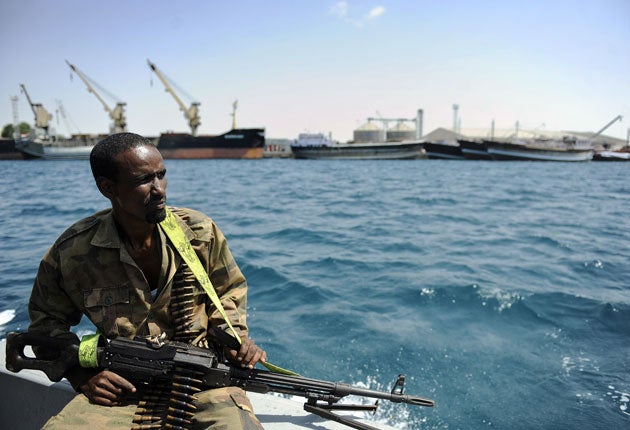'Out of control' piracy set to cost world £9bn by 2015
Crime at sea is ever more lucrative: in East African waters, pirates pocket 150 times the national wage

Somali pirates are earning more than 150 times their country's national average wage in what has become a multimillion-dollar business, a new study reveals.
Experts believe that pirates in the East African country – the most dangerous point in a rising tide of piracy at sea – earn up to $79,000 a year. It is a stark contrast to the average annual income in Somalia of $500.
The study, by the political and economic intelligence consultancy Geopolicity, has been prepared for delegates ahead of an international piracy conference that starts in Dubai tomorrow. It is one of the first attempts to map the economics behind piracy.
The results, revealed exclusively to The Independent on Sunday, highlight the magnitude of the problem, with attacks at record levels and huge financial rewards set to swell the ranks of pirates. What began as an attempt to protect local waters by vigilante Somali fishermen in the mid-1990s swiftly developed into piracy that now extends to some 2.5 million square nautical miles off Somalia's coastline, an increase of one million nautical miles from two years ago, according to the study.
Somali piracy was worth $238m last year and is set to rise to $400m by 2015. The costs of piracy could virtually double in that time – from $8.3bn in 2010 to more than $15bn (£9.1bn) by 2015.
The continued growth of piracy, fuelled by organised and armed gangs using "motherships" to enable them to attack further afield, could see the numbers of pirates, estimated to be at least 1,500, rise by up to 400 a year.
Peter Middlebrook, head of Geopolicity, said: "Pirates are the very essence of rational profit maximising entrepreneurs." He predicted that incidents would "expand substantially beyond Somali waters – given the rising income disparity between pirates and non-pirates".
Pirates are part of a complex "piracy value chain" ranging from financial backers to accountants and arms dealers. "The risks of piracy spreading beyond the Red Sea and Indian Ocean, off the Somali coast, and in the Straits of Malacca and Singapore and beyond are substantial," warned Dr Middlebrook.
A United Nations source, speaking on condition of anonymity, said: "Research like this is vital, but we urgently need a comprehensive study so that we can have a united approach based on shared intelligence. There are international working groups working on specific subjects of piracy, but nobody seems to know what exactly is going on."
Amid mounting concerns that piracy is out of control and in danger of spreading, this week the United Arab Emirates (UAE) will announce a $17m donation to the UN-backed international coalition the Contact Group on Piracy off the Coast of Somalia, according to UN sources.
Sheikh Abdullah bin Zayed al Nahyan, UAE Minister of Foreign Affairs, said: "We must all urgently double our efforts in the current international response. Global efforts are not producing the results we are all aiming for."
Somali pirates, typically armed with AK-47 assault rifles and rocket-propelled grenades, have become increasingly violent in recent months, killing and injuring dozens of hostages.
Piracy has soared in the past five years, from 276 incidents in 2005 to 445 in 2010. Attacks for the last quarter were at an all-time high, according to statistics from the International Maritime Bureau. There were 142 attacks between January and March – 97 off the coast of Somalia – up from 35 in the same period last year. Pirates seized 18 vessels worldwide, capturing more than 340 hostages in attacks in which seven crew members died and 34 were injured.
Maritime unions are threatening to boycott certain trade routes. In February, the International Chamber of Shipping reversed its long-held position against armed security, and now suggests that it could be an option.
Join our commenting forum
Join thought-provoking conversations, follow other Independent readers and see their replies
Comments
Bookmark popover
Removed from bookmarks